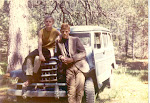Having toiled over the actual technical aspects of this project I realized I was jumpimg in the pool backwards. Seeing the bottom suddenly became less important than getting my feet wet. The whole thing is both a trip down memory lane and a learning process. To begin with, my project is in 4 functioning parts. The first part is what we could call a blast from the past. I wanted to show my audience visually the path of my own technoLiteracy memoir. So, creating a power point seemed innocuous enough. The second part of the project is quite obviously the use of this blog to be the technological vehicle for the generalized information. The third part is the old-fashioned written paper which depicts the course of my personal media literacy. And finally, the most alien piece of the puzzle is the Podcast. The entire project was a learning process. Creating a podcast gave way to yet another way to blend into the new face of technology and media literacy.
After gathering and "uploading" my memories I realized that simple text was just not enough to show any advancement I have achieved as a media literate writer. I am incorporating a link to a piece of technology that I find to be off the charts in the catagory of media literacy. The device of all literary devices and the internet gods present: the new Kindle2 ebook. Also, if you are in the market to purchase this bizarre and innovative piece of technology try going here. I am also incorporating a link to the how-to video of this device.
And last but certainly not least is the video podcast. Please enjoy the music too!
9.2.09
2.2.09
A New Book for a New Brain

While reading Bolter's book I am drawn to certain simple words such as "space" and "control." The space extends into the nether regions of cycling cyber pages. And to truly appreciate the changeling technology of online "literature" the reader must willingly relinquish his/her control. In chapter five Bolter addresses the concepts and confines of both books and the possible new face of literature: the electronic book. Mainly, Bolter is exercising the idea that unlike books the data in an electronic book and/or written online document very purposefully lacks closure. For instance, let us say that I wanted to read a book via online. Regardless of whether the book was published specifically for (or by) the World Wide Web or if it is John Steinbeck's East of Eden in a pdf file, the outcome for the reader is the same: an unending circuit of information following the close of the story. An example would be the links posted at the end depicting websites where one could buy the book, read criticism online, or something as random as being redirected to a website for carpet cleaner or chewing gum (though I have yet to come across a website for bubble gum). All things at one point in time where an invention- were shiny and new. Bolter points out that even the ancients had to change from writing information on rolls to finally divining an actual book. The origin of books gave way to a change in verbal communication, and so on and so forth.
The more things change, the more they stay the same. Our culture has never ceased changing and inventing new ways to grow and alter our brains (it's the beauty of a collective unconscious). Bolter uses the term "refashion." The term accurately describes the changing face of literature, print, and written media. Suddenly, we no longer crave a sense of peaceful closure to the story- but instead we have re-routed our brains to desire an ad infinitum of knowledge.
Subscribe to:
Posts (Atom)




